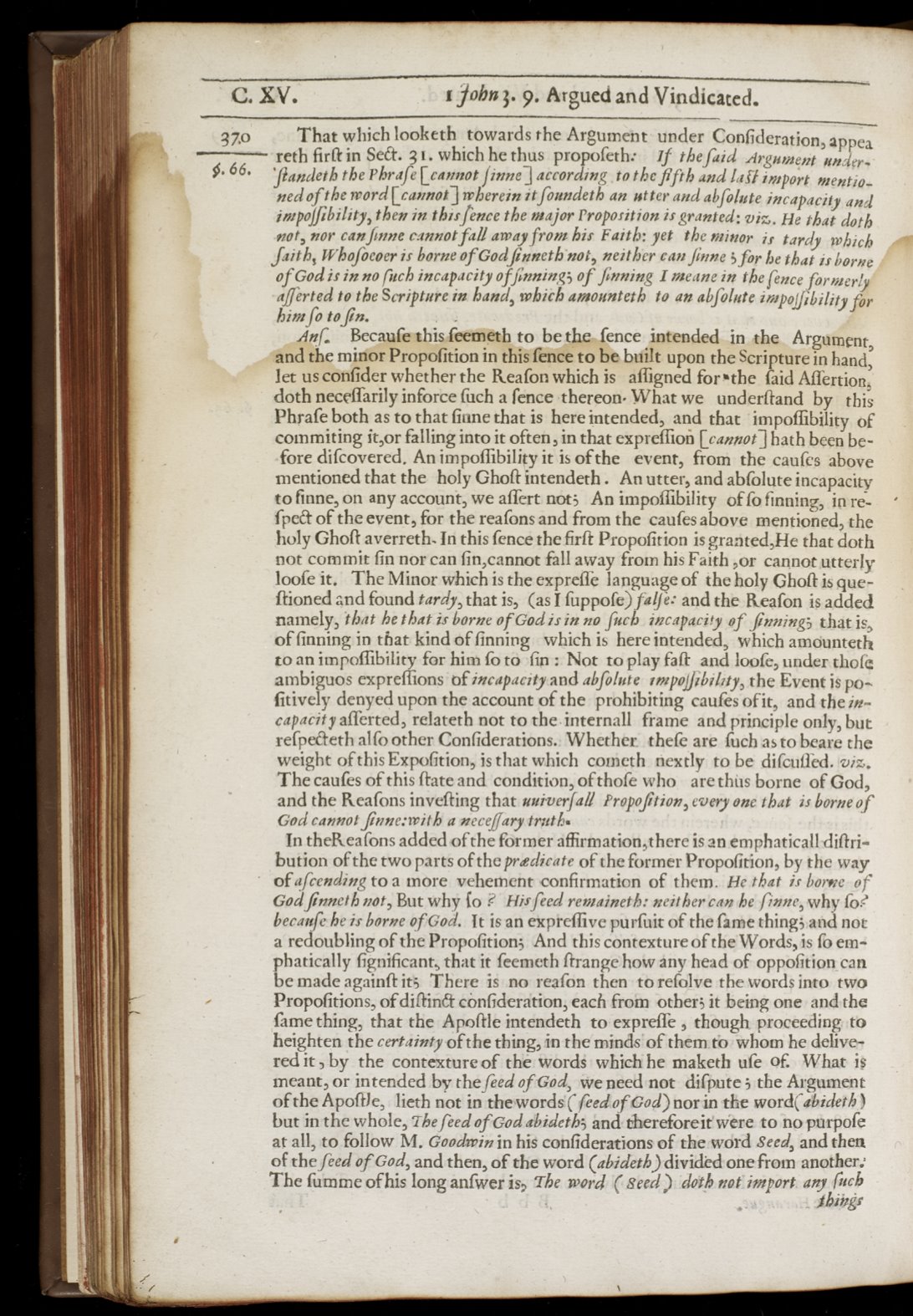

C.
kV.
t
John
3.
9. Argued
and Vindicated.
37,o
That
which
looketh towards the Argument under
Confideration,
appea
4.66.
reth
first in
Se&.
3
t.
which
he thus propofeth:
If
the
faid
Argilment
ender.
ßandetb
the Phrafe
[cannot
f
inne]
according.
to
the
fifth
and
Lift import
mentio_
ned
ofthe word[cannot]wherein
it
foundeth
an
utter
and
abfolute incapacity
and
impostbility, then in
this.
fence
the major
Proposition is
granted:
viz.
He
that
doth
not, nor canfinne
cannot
fall
away
from
his
Faith: yet
the minor
is
tardy
rohich
faiths
Whofoeoer
is
borne
ofGodfinneth"not, neither can
fanne
5
for
he
that
isborne
of
God
is
in
no [itch
incapacity
of
fnning5
of
finning
I
meane
in
the
fence
formerly
alerted
to
the Scripture
in hand,
which amounteth to an abfolute impo(
ability
for
him
fo
to
fan.
Because
this feemeth
to
be
the
fence
intended
in
the
Argument,
and the minor Proposition
in this fence
to
be
built
upon
the Scripture
in
hand,
let
us
confider
whether the Reafon
which
is
affìgned
for
.the
faidAfsertion,
doth
neceffarily inforce
fuch
a
fence
thereon.
What
we
understand by
this
Phrafe both
as
to that lime that
is
here
intended,
and
that
impof
ability
of
commiting it,or falling into it
often,
in
that
expreffìon
[cannot] hath
been
be-
fore difcovered.
An
impoffìbility it
is
ofthe
event,
from
the
caufes above
mentioned
that
the
holy Ghost
intendeth
.
An
utter,
and
abfolute
incapacity
to
ftnne,
on
any
account, we affert not
An impossibility
of
fo
finning, in re-
fpe&
of
the event,
for
the
reafons
and from
the
caufes
above
mentioned,
the
holy
Ghoft
averreth.
In this fence
thefirft Propofition
is
granted,He that doth
not commit
fin
nor
can
fin,cannot
fall away
from
his
Faith
,or
cannot
utterly
lode
it.
The
Minor
which
is
the
expreffe
language
of
the
holy Ghoft
is
que-
ftioned and found
tardy,
that
is,
(as
I
fuppofe) falJe: and
the
R.eafon
is
added
namely,
that
he
that
is borne
of
God
is in
no
fach
incapacity
of
fanning,
that
is,
of
finning in
that
kind
of
finning which
is
here
intended,
which
amounteth
to
an impoffibility for him
fo
to
fin
:
Not
to
play fait and
look,
under thofè
ambiguos
expreffions
of
incapacity
and
abfolute ampojfibility,
the
Event
is
po-
fitively denyed upon the account
of
the
prohibiting
caufes
of
it, and theirs-
capacity
afherted,
relateth not to the .internall frame and
principle only,
but
refpeð alfo
other
Confederations.:
Whether
thefe are
fuch
as
to beare
the
weight
of
this
Expofition,
is
that
which
cometh nextly
to
be
difcuffed.
viz.
The
caufes
of
this ftate
and condition,
ofthofe
who are thùs
borne
of
God,
and
the Reafons invefting
that
uuiverfall
Propofition, everyone
that
is
borne
of
God cannot
fnne
:with
a
necefary
truth.
In theReafons added
of
the former affirmation,there
is
an emphaticail
diftri-
bution
of
the two parts
of
thepredicate
of
the former Propofition,
by
the
way
of
afcending
to
a
more
vehement confirmation
of
them.
He
that
is
borne
of
God
finneth
not, Butwhy
fo
? His
feed
remaineth: neither can
he
£inne,
why fo?
becau{ehe
is
borne
of
God.
It
is
an
expreffiive
purfüit
of
the
fame things
and not
a
redoubling
of
the
Propofition; And
this
contexture
of
the
Words,
is fo
em-
phatically
fignificant,
that
it feemeth
ftrange
how any
head
of
oppofition can
be
made againft
its
There
is
no reafon then
to
refolve
the
words
into two
Propofitions, ofdiftin& confideration, each from others it being one and the
fame thing,
that
the
Apoftle
intendeth
to
expreffe
,
though, proceeding
to
heighten
the
certainty
of
the thing, in the
minds
of
them,
to
whom he delive-
red
it,
by the
contexture
of
the
words which he maketh
use of.
What it
meant, or intended by the
feed
of
God,
we need
not
dispute
5
the
Argument
of
the
ApoftJe,
lieth
not
in
thewords
(
feed
of
God) nor
in
the
word(abideth
)
but
in
the
whole,
The
feed
of
God
abideth;
and
thereforeit
were
to
no purpofe
at
all,
to
follow M.
Goodwin
in
his
confederations
of
the
word
Seed,
and then
ofthe
feed
of
God,
and
then,
of
the
word (abideth) divided onefrom another:
The
fumme
ofhis
long anfwer is,
The
word
(
seed)
cloth
not
import
any (uch
,thingr










